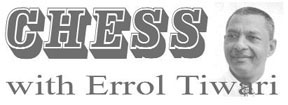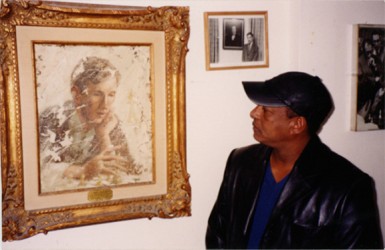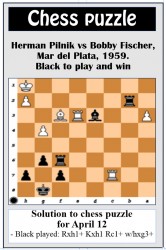As I conclude the lengthy Karpov interview discussing only Fischer, I was surprised when Karpov, over dinner in Nassau, noted that Fischer had legions of chess fans in the Soviet Union during his match with Spassky. There was a mystique about Fischer which continues to fascinate people who are not even remotely connected to chess. No other chess player, alive or dead, has succeeded in capturing the imagination of people around the world like Fischer did.
He did more to popularize chess than any other player who has ever lived. His tantrums and inexplicable actions were front page news wherever he went. Fischer was the ego-crushing titan of chess who singlehandedly broke the Soviet hegemony on the ancient brain game. He was already a legend before he even played for the world championship title. The commotion generated over Fischer’s conquest of the awesome Soviet chess machine generally, and Spassky in particular, was unprecedented. A genuine renaissance occurred overnight. Sales of chess sets increased. Everybody who was anybody wanted to play chess. Rarely had chess been so honoured. Besides becoming a national hero in his own country, Fischer had become a household name.
Irwin W Fisk: So Fischer flew there [in 1976, Tokyo] just to meet you?
Anatoly Karpov: Yes, Campomanes joined me for the flight to Tokyo, but of course he knew already that Fischer would be in Tokyo. When I arrived, Matsumoto was already in the airport, then we agreed to have dinner in the Hilton Hotel. I was in the hotel and then Campomanes stopped there in the Hilton. He asked me to come to his suite, so I came to his suite and he said I should expect a surprise. Suddenly, Campomanes went out and one minute later he came with Fischer, so this was a big surprise, of course. We greeted each other and shook hands, and then he started to talk. I think Matsumoto presided at this meeting and suggested we all have dinner together. It was unbelievable, because the Hilton is a big hotel, but as I remember we got to the restaurant at 7:00 o’clock in the evening and there were no other people in the restaurant. I was especially amazed that we had a table for four with no other people. We had a very quiet dinner; it was maybe like two hours. We discussed the possibility of playing a match, so of course we realized if we had been able to meet before, we would have played in 1975, a match. But, I think Fischer wasn’t ready to play, psychologically. He could not even tell himself he wasn’t ready… When Fischer was with Campomanes, he said he was ready to play, but when he was alone and probably for himself he was saying, “No, no, I’m not going to play.” I think this was his problem.
 IF: When you were having the conversation with Fischer, what did he say about not playing you?
IF: When you were having the conversation with Fischer, what did he say about not playing you?
AK: No, we didn’t discuss this. I realized Fischer was [complicated] and argumentative…
IF: Would the match be outside of normal channels or would it be for the world championship?
AK: He understood and realized and I understood that it would be the biggest match, so it didn’t matter, the cycle. For Fischer, this became important. Probably, I believe this was the final excuse for him not to play, because he insisted to have the title of Absolute World Championship of Chess Professionals.
IF: Where were you when you heard that Fischer died?
AK: I was in Germany, in Hattenheim, a famous place of Formula One racing. I have a chess school there and we had a training session with the junior team of Germany. I think the director of the school came and said he had received news that Fischer had passed away. It was very sad.

IWF: What did you think at that time?
 AK: Just as I said, it was shocking news, but I knew he had some health problems, maybe due to this prison in Japan. Also, he was captured in Pasadena. He wrote even a small book about his days in prison in Pasadena. He wrote that he was beaten. So, who knows? Maybe this was one of the reasons he started to have health problems. He was swimming, playing tennis and so he paid attention to his health, but suddenly he got these problems and as we know now he didn’t want to take his medicines, even medicine recommended by doctors. He didn’t believe them that he had these problems and so he died in the hospital. Of course the chess world lost a fantastic chess player and an extraordinary person. You may consider differently his declarations, but he was outstanding as a chess player. As I say, he probably was one of the most famous American citizens, even if he didn’t live all these years in the United States. He was one of the most famous, maybe Kennedy, Fischer, Elvis Presley, Marilyn Monroe. Even now, I know for sure in Russia if you asked people, they would say Fischer.
AK: Just as I said, it was shocking news, but I knew he had some health problems, maybe due to this prison in Japan. Also, he was captured in Pasadena. He wrote even a small book about his days in prison in Pasadena. He wrote that he was beaten. So, who knows? Maybe this was one of the reasons he started to have health problems. He was swimming, playing tennis and so he paid attention to his health, but suddenly he got these problems and as we know now he didn’t want to take his medicines, even medicine recommended by doctors. He didn’t believe them that he had these problems and so he died in the hospital. Of course the chess world lost a fantastic chess player and an extraordinary person. You may consider differently his declarations, but he was outstanding as a chess player. As I say, he probably was one of the most famous American citizens, even if he didn’t live all these years in the United States. He was one of the most famous, maybe Kennedy, Fischer, Elvis Presley, Marilyn Monroe. Even now, I know for sure in Russia if you asked people, they would say Fischer.
Chess game
The following game was played at 2015 US Championship in Saint Louis.
The tournament was won by Hikaru Nakamura.
White Conrad Holt Black Hikaru Nakamura
1. d4 Nf6 2. c4 g6 3. Nc3 Bg7 4. e4 d6 5. Nf3 O-O 6. h3 e5
7. d5 Nh5 8. g3 Na6 9. Nd2 Qe8 10. Be2 Nf6 11. h4 Nd7 12. h5
f5 13. hxg6 hxg6 14. exf5 Nf6 15. fxg6 Qxg6 16. Nf3 Nb4
17. Nh4 Qh7 18. Kf1 Bf5 19. Kg1 Bc2 20. Qd2 Ne4 21. Nxe4 Qxe4
22. Bf1 Bd3 23. Bh3 Nc2 24. Be6+ Rf7 25. Nf5 Ne1 26. Ne7+ Kf8
27. Ng6+ Ke8 0-1.









